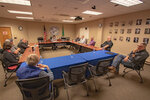



Third District U.S. Rep. Marie Gluesenkamp Perez met with local broadband providers, a handful of local rural broadband users and Lewis County Public Utility District (PUD) staff members at the PUD office in downtown Chehalis, Tuesday, April 2, for a roundtable discussion on how to provide better broadband access throughout rural Lewis County.
Last year, the federal government rolled out the Broadband Equity, Access, and Deployment (BEAD) Program, which allocated more than $42 billion toward a federal high speed internet grant program available to all 50 states.
Glusenkamp Perez first asked those in attendance to talk about how they gauged their customers’ broadband, though BEAD was eventually discussed.
Among those in attendance included ToledoTel CEO Dale Merten, ToledoTel safety director Fred Rider, NoaNet telecommunications director Chris Walker and PUD broadband manager Willie Painter.
Joining them were Lewis County Commissioner Lindsey Pollock, Lewis County Broadband Action Team Chair Frank Corbin, Lewis County Broadband Action Team Vice Chair Edna Fund, Port of Chehalis operations manager Bill Teitzel and the owner of the organic dairy farm Mallonee Farms in Boistfort, Maynard Mallonee.
“The reason I’m looking for internet is because I have an advanced dairy farm, and I have a robotic milker, which requires some form of internet service,” Mallonee said. “Currently, I’m just on a satellite, which doesn’t work very good all the time.”
He added better internet would also help improve security at his farm.
Merten talked about the popularity of fiber internet connections, including the recent work ToledoTel has done in new Winlock housing developments.
“All those houses that have fiber with ToledoTel, and that place has just exploded because of that,” Merten said. “There’s three developers in that area, and they market the heck out of the fiber. Every house they build, it sells, almost instantly.”
Whether it is used for streaming videos to doing homework to telecommuting, Merten said for new developments, fast internet access is vital.
“I never thought ToledoTel would be a green company, but we are because people telecommute and work from home,” said Merten.
Broadband access in rural areas is becoming increasingly needed for everyone because, despite the COVID lockdowns having ended more than two years ago, many who began telecommuting over the pandemic continue to do so, including some farmers.
“My cooperative is based out of the Midwest, Wisconsin, so I have a lot of Zoom calls,” Mallonee said. “... There are also a lot of farmers doing things like trading cattle, commodities, all that stuff, or monitoring it, on a constant basis, all from home.”
Fund added medical providers are also looking for better internet access, especially in rural areas.
“Just this morning I was sitting with some medical providers talking about broadband and medical provisions,” Fund said. “... They’re thinking about putting together, with the local (Timberland) libraries, a place where elderly people can come to and learn how to telemed with their own devices. But when they get home, they don’t have any internet, so they have to go to the libraries to use them, so broadband is a crucial issue for health provision.”
Lack of quality broadband in rural Lewis County extends to all around the remote parts of the county but also to the more populated areas.
“You can call it underserved, but you might as well call it not served.” Rider added. “Some of the folks out in Winlock, the horror stories we hear from them, three o’clock in the afternoon they go to get on, and they’re not anywhere near even a megabyte (per second). They’re in the Ks (kilobytes).”
As for BEAD, Painter told Glusenkamp Perez the funds weren’t very accessible, especially for more rural communities.
“As you’re aware, BEAD requires a 25% match, and we can all agree for many entities, private as well as public, 25% is pretty restrictive. I would even go as far as to say it’s prohibitive,” Painter said.
“Congratulations to the federal government for coming up with this 75% funding program, that’s great, but that 25% remaining is still just enough of a barrier to prevent what the state hopes to be is internet for all,” Walker added.
Walker also said statewide, there are 300 project areas that qualify for BEAD, but there won’t be enough money to go around even if each area can come up with the 25% match.
The loss of the Federal Communications Commission’s (FCC) Affordability Connectivity Program (ACP) was also discussed by those at the round table, as this April is the last month the ACP will be funded.
Originally created in 2021, the ACP was an FCC benefit that aimed to ensure households could afford the broadband access they needed for work, school, health care and more by providing up to a $30 per month discount toward internet services, or up to $75 per month for households on qualifying tribal lands.
Despite this, Merten said ToledoTel customers never used it.
“It is cumbersome with some of the requirements,” Merten added.
With the ACP set to expire at the end of the month, a resolution has been introduced in the U.S. Senate to keep funding the program.
And even with the $42 billion BEAD is providing, Corbin echoed Walker’s sentiments that the county would need more money to build better broadband infrastructure.
“We’re still looking at needing, by the time it rolls around, another $100 million just for the PUD to do what it needs to do, let alone ToledoTel and other ISPs,” Corbin said.
Glusenkamp Perez thanked those at the round table for their input, and told The Chronicle she will take their concerns to the U.S. House floor.
“In my experience, you have to find a way to say something differently than how everybody else is, if you want them to remember that Southwest Washington is the one that really needs the money,” Glusenkamp Perez said.